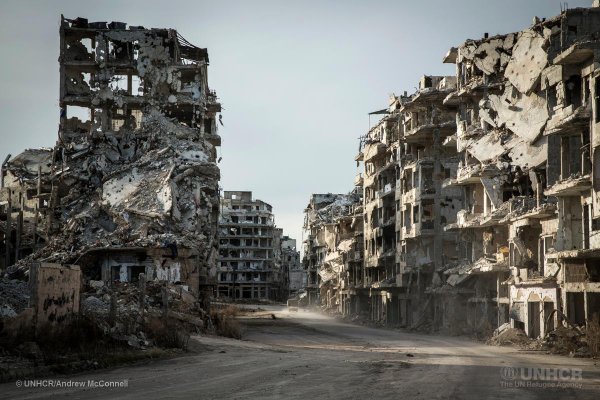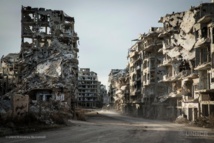In China, where world powers were gathered for the G20 meeting, US President Barack Obama and Russian counterpart Vladimir Putin touted "productive" talks and "some alignment" on Syria.
But the two powers failed to produce an expected deal to ease the violence in Syria, where more than 290,000 people have been killed and more than half the population displaced since March 2011.
The latest carnage came in a wave of blasts, the deadliest of which was a double bombing in the coastal province of Tartus, a stronghold of President Bashar al-Assad's government.
The bombings hit the Arzuna bridge outside the provincial capital of Tartus city, killing at least 35 people and wounding 43, state media said.
Tartus has been largely spared the worst violence of Syria's conflict since it began with anti-government protests, and has become a refuge for many Syrians fleeing the fighting.
In the northeastern city of Hasakeh, mostly controlled by Kurdish forces, a bomber on a motorbike killed six members of the Kurdish security forces and two civilians.
- 'Simultaneous attacks' -
In central Homs city, the target was the Al-Zahraa neighbourhood, whose residents are mostly from the same Alawite sect as Assad and have regularly been targeted.
Four people were killed there in a car bombing that hit a checkpoint at the district's entrance.
State television broadcast images of the aftermath, showing rubble strewn on the streets and smoke rising from the charred remains of vehicles.
Another attack hit the Al-Sabura road west of the capital Damascus, with state media saying one person was killed and three wounded.
The Syrian Observatory for Human Rights, a Britain-based monitoring group, said that attack targeted a checkpoint and killed three people.
The IS-affiliated Amaq agency carried a statement saying the jihadist group was behind a "string of simultaneous suicide attacks".
Syria expert Thomas Pierret said the attacks were part of a new IS "strategy... to 'seduce' rebels by demonstrating IS's capacity to strike the regime".
"IS also wants to whip up sectarian tensions for its benefit and is counting on more of these events to mobilise its supporters in these regions," he told AFP.
The latest violence came a day after Turkish forces and allied rebels seized the last part of the Turkish-Syrian border under IS control.
The operation -- dubbed "Euphrates Shield" -- pushed further into IS territory on Monday and captured another five villages, the Observatory said.
Turkey began an operation inside Syria on August 24, targeting both IS and Syrian Kurdish forces that have been a key US partner in fighting the jihadist group in Syria.
- Obama, Putin talk Syria deal -
The operation has put Washington in an awkward position, with two key allies at times clashing.
A State Department spokesman said Monday Washington's envoy to the US-led coalition against IS was in Syria and Turkey last week for talks with Syrian Kurdish forces and Turkish officials.
Washington has urged Kurdish forces to honour a pledge to withdraw east of the Euphrates river to allay Turkish fears of a contiguous semi-autonomous Kurdish zone in Syria.
Turkey's President Recep Tayyip Erdogan said Monday he was working with Russia and the US to have northern Syria declared a no-fly zone, a proposal that has failed to materialise in the past.
Washington backs the uprising against Assad, but is working with his key ally Moscow on how to stem the bloodshed.
Hopes had been raised that a deal would be announced over the weekend, but US officials said it floundered after Russia backtracked.
Despite this, Obama said Monday a meeting with Putin on Syria had included "productive conversations about what a real cessation of hostilities would look like".
Putin said he felt there was "some alignment of positions and an understanding of what we could do to de-escalate the situation in Syria".
He said a deal could be firmed up in the "coming days" but refused to elaborate, saying that US and Russian officials are still "working out some of our preliminary agreements".
US Secretary of State John Kerry and his Russian counterpart Sergei Lavrov are expected to continue the talks in the coming days.
----------------------------------------------------------------------------------------
But the two powers failed to produce an expected deal to ease the violence in Syria, where more than 290,000 people have been killed and more than half the population displaced since March 2011.
The latest carnage came in a wave of blasts, the deadliest of which was a double bombing in the coastal province of Tartus, a stronghold of President Bashar al-Assad's government.
The bombings hit the Arzuna bridge outside the provincial capital of Tartus city, killing at least 35 people and wounding 43, state media said.
Tartus has been largely spared the worst violence of Syria's conflict since it began with anti-government protests, and has become a refuge for many Syrians fleeing the fighting.
In the northeastern city of Hasakeh, mostly controlled by Kurdish forces, a bomber on a motorbike killed six members of the Kurdish security forces and two civilians.
- 'Simultaneous attacks' -
In central Homs city, the target was the Al-Zahraa neighbourhood, whose residents are mostly from the same Alawite sect as Assad and have regularly been targeted.
Four people were killed there in a car bombing that hit a checkpoint at the district's entrance.
State television broadcast images of the aftermath, showing rubble strewn on the streets and smoke rising from the charred remains of vehicles.
Another attack hit the Al-Sabura road west of the capital Damascus, with state media saying one person was killed and three wounded.
The Syrian Observatory for Human Rights, a Britain-based monitoring group, said that attack targeted a checkpoint and killed three people.
The IS-affiliated Amaq agency carried a statement saying the jihadist group was behind a "string of simultaneous suicide attacks".
Syria expert Thomas Pierret said the attacks were part of a new IS "strategy... to 'seduce' rebels by demonstrating IS's capacity to strike the regime".
"IS also wants to whip up sectarian tensions for its benefit and is counting on more of these events to mobilise its supporters in these regions," he told AFP.
The latest violence came a day after Turkish forces and allied rebels seized the last part of the Turkish-Syrian border under IS control.
The operation -- dubbed "Euphrates Shield" -- pushed further into IS territory on Monday and captured another five villages, the Observatory said.
Turkey began an operation inside Syria on August 24, targeting both IS and Syrian Kurdish forces that have been a key US partner in fighting the jihadist group in Syria.
- Obama, Putin talk Syria deal -
The operation has put Washington in an awkward position, with two key allies at times clashing.
A State Department spokesman said Monday Washington's envoy to the US-led coalition against IS was in Syria and Turkey last week for talks with Syrian Kurdish forces and Turkish officials.
Washington has urged Kurdish forces to honour a pledge to withdraw east of the Euphrates river to allay Turkish fears of a contiguous semi-autonomous Kurdish zone in Syria.
Turkey's President Recep Tayyip Erdogan said Monday he was working with Russia and the US to have northern Syria declared a no-fly zone, a proposal that has failed to materialise in the past.
Washington backs the uprising against Assad, but is working with his key ally Moscow on how to stem the bloodshed.
Hopes had been raised that a deal would be announced over the weekend, but US officials said it floundered after Russia backtracked.
Despite this, Obama said Monday a meeting with Putin on Syria had included "productive conversations about what a real cessation of hostilities would look like".
Putin said he felt there was "some alignment of positions and an understanding of what we could do to de-escalate the situation in Syria".
He said a deal could be firmed up in the "coming days" but refused to elaborate, saying that US and Russian officials are still "working out some of our preliminary agreements".
US Secretary of State John Kerry and his Russian counterpart Sergei Lavrov are expected to continue the talks in the coming days.
----------------------------------------------------------------------------------------









 Home
Home Politics
Politics











